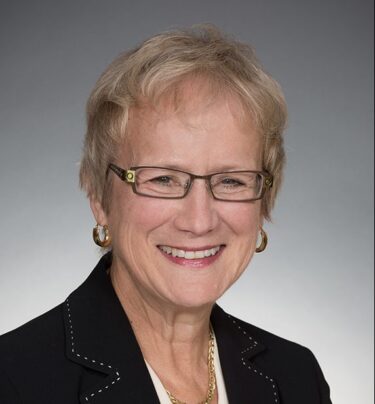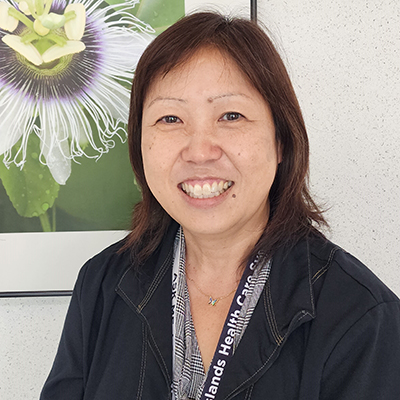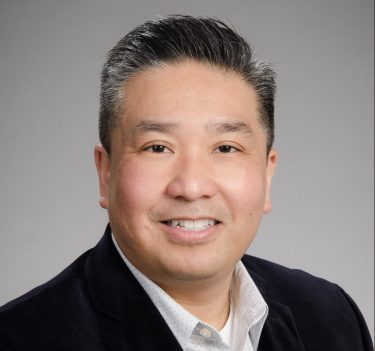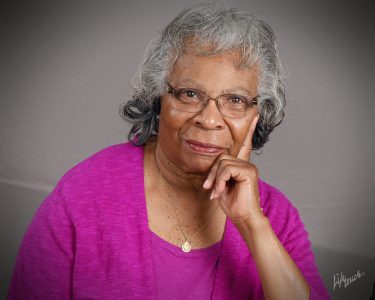2022 Nurses of Influence Awardees
2022 Nurses of Influence Awardees
We are proud to present the 2022 Nurses of Influence Awards to five exceptional individuals, who have shown dedication, leadership, and commitment to advancing nursing both locally and globally. These awardees were nominated by their peers and selected by a panel of School of Nursing leadership, faculty, and advisory board members.
Distinguished Advocate, Administrator, Leader Award
This award recognizes an individual who demonstrates excellence in nursing advocacy, patient advocacy, administration and leadership; serves as a champion for the nursing profession; actively seeks to improve nursing management and administration; and goes above and beyond across the nursing-practice continuum.
 Louise Peterson, MN, RN
Louise Peterson, MN, RN
Nurse Manager in Primary Care, Community Health Services
Public Health-Seattle & King County
“For me,” says Louise Peterson, MN, RN, “the road to becoming a nurse leader happened one small drop at a time.”
Peterson, a nurse manager for Public Health-Seattle & King County, hadn’t planned to become a nurse at all. She had intended to pursue international studies at the University of Washington when, in her sophomore year of college, she took a class called the “Psychobiology of Women” to fulfill natural science prerequisites. The class, which covered the psychosocial and biological lives of women from conception through the end of life, was a game-changer.
“This class upended my world,” says Peterson. “From that time forward, I knew I wanted to care for women and their babies.”
That’s precisely what Peterson has done. In a 30-year nursing career, she has worked as a clinical nurse in maternal-child health, pediatrics, lactation, and primary care. Today, in her public health role, she supports a nurse education, practice, quality, and retention grant. When asked if she has one accomplishment she’s particularly proud of, Peterson demurs, noting that the accumulation of 30 years of learning — at the bedside, and from her patients and colleagues — is a source of pride and the wellspring of her desire to lead.
“You can lead at the bedside,” Peterson says. “There’s also leadership in the daily work of advocating for patients, triaging and organizing our work, identifying and solving practice gaps, and mentoring students.” Mentorship, in particular, strikes a chord; Peterson had a wonderful mentor in Ginna Wall, MN, RN, her supervisor at UW Medical Center for 12 years.
“Ginna taught me how important it is to mentor and teach the next generation of nurses,” says Peterson. “She’s a humble leader who shares power, deeply listens, and is always willing to say ‘I don’t know, but let’s find out.’”
In her turn, Peterson is thinking about how she leads, how she mentors, the ways in which she can encourage young people to succeed as nurses. She notes that many new nurses leave the profession within five years of graduation, and that the pandemic only made nurses’ lives harder. Peterson wants to share her passion with tomorrow’s students while preparing them for the risk and responsibility.
“I want to be able to honestly say that nurses will flourish inside robust organizations and systems that support them and their patients,” Peterson says. “As a nursing leader, I know we have a lot of work to do to full fill this promise, but I believe it is possible to heal from the pandemic and reimagine a new way forward.”
Distinguished Researcher Award
This award recognizes an individual whose research, professional achievements and cumulative contributions have brought personal distinction, enhanced the profession, improved the welfare of the general public and brought honor and prestige to their field.
 Frances Marcus Lewis, PhD, MN, MA, RN, FAAN
Frances Marcus Lewis, PhD, MN, MA, RN, FAAN
Professor, UW School of Nursing, Department of Child, Family, and Population Health
UW Medical Center Endowed Professor of Nursing Leadership
Nursing Affiliate, Fred Hutchinson Cancer Research Center
Member Fred Hutchinson Cancer Research Center, Division of Public Health Sciences
When asked about her proudest accomplishment, Frances Marcus Lewis, PhD, MN, MA, RN, FAAN, is hard-pressed to reply. “I don’t think I have ‘accomplished’ anything,” the nurse-researcher says. “I think more about what I don’t know — yet — than what I’ve accomplished.”
Lewis’s deep interest in science and the pursuit of knowledge dates back to her youth; she was planning to pursue microbiology in college. A stint as a nurse’s aide in a small clinic, however, changed Lewis’s trajectory.
“I watched the physicians talk with the patient for a few minutes, prescribe medications, and then leave the room. And I saw how confused the patients and family members still were,” she says. Lewis, then 16, also observed how adroitly the clinic’s nurse stepped in to explain, advise, and reassure — and how necessary nursing care is to the medical treatment plan.
In the decades that followed, Lewis would become a nurse and a researcher. She has spent more than 25 years describing, statistically modeling, and designing behavioral interventions to enhance patients’ well-being — and the well-being of their caregivers and dependent children — during serious illness. In 1989, in fact, her first published paper in Social Science & Medicine helped prove to the scientific community that family-focused research could be data-driven. This foundational work led to more studies and grants, including the clinical intervention studies she and her lab are now conducting.
Today, Lewis and her lab are working on multiple projects that track how patients and loved ones cope and communicate in the face of major illness. One project studies how the quality of the parent-child relationship could be improved during a parent’s last few months of terminal cancer. It’s a novel direction for this type of research.
“All prior bereavement studies have focused on the impact of the parent’s death or illness after the parent has died. This means we know nothing about what could moderate the impact of the parent’s late-stage disease on the child’s behavioral-emotional adjustment post-death,” says Lewis.
It’s clear that Lewis is dedicated to using research to better patients’ and families’ lives. She is also dedicated to the field of nursing.
“I love being a nurse. Nurses walk with patients, family members, and caregivers. They help steward people through their health-wellness-illness journey across the lifespan,” says Lewis.
“You could take all my degrees away except my BSN,” she says, “and I would feel fulfilled.”
Distinguished Alumni Award
 Deanna Iwamoto, RN, BSN
Deanna Iwamoto, RN, BSN
Advanced Liver Disease/Hepatitis C Care Coordinator
VA Pacific Islands Health Care System
“Nursing encompasses the best of the human spirit,” says Deanna Iwamoto, RN. “You must be caring, kind, resourceful, a good teacher and communicator, an advocate, and a good listener.”
Nurses must, in short, be able to develop a trusting rapport with their patients — a set of skills that Iwamoto uses daily with military veterans seeking care from the VA Pacific Islands Health Care System.
Iwamoto, who grew up in a small town called Hilo on Hawaii, came to the University of Washington as a freshman. It was a bit of culture shock. The campus was big; the freshman classes were dauntingly full of students. Then she saw an article on the front page of The Daily, the UW’s school newspaper, noting that the UW School of Nursing was the No. 1 nursing school in the country. Iwamoto, who had been considering becoming a doctor, felt a flash of inspiration.
“It’s hard to explain how everything fell into place for me after that,” she says, “but nursing is truly the profession I was meant to be in, and I love all aspects of nursing.”
Since graduating from the UW in 1993, Iwamoto has worked in many different nursing positions: in home care, medical surgery, the burn unit, cardiac rehabilitation, and others. Then, 14 years ago, she began working in outpatient care at the VA Pacific Islands Health Care System in Honolulu. Today, she’s the coordinator for advanced liver disease/hepatitis C care, and she takes care of a group of veterans with multiple serious health challenges.
“Many of my hepatitis C patients are unhoused, recently released from prison, and have mental health or substance-use problems,” she says. “Most are also very distrustful of the VA medical system, and many of them live on another Hawaiian island or in Guam.” Often, her work is conducted entirely over the phone.
“Building trust with a veteran who never sees you in person is a challenge,” says Iwamoto. Ultimately, though, creating a trusting partnership improves the vets’ compliance with medication. Iwamoto also connects veterans to primary care so other chronic conditions can be addressed.
“Even though I have been nursing for almost 30 years, there has never been a dull moment,” says Iwamoto. “I am blessed to be part of this profession.”
Distinguished Practitioner Award
This award honors a nurse who demonstrates excellence in nursing care, serves as an advocate for patients, families and/or communities, makes a recognizable difference through their practice, and embodies the essence of the nursing profession.
Frankie Manning, MSN, RN
Frankie Manning, MSN, RN, knew she wanted to be a nurse before she went to elementary school. One of her great aunts, a midwife, was her inspiration.
“She not only took care of the mother and baby, but the whole family,” Manning says. “She was well-respected by all in the community.”
In her turn, Manning is greatly respected in multiple communities. She has inspired scores of colleagues, patients, and friends during decades of service and innovation in the U.S. Army, in the U.S. Department of Veteran Affairs, and in academia.
“I would encourage anyone interested in nursing to become a nurse,” says Manning. “It is a great opportunity to serve others and make a difference in someone’s life in their time of greatest need.”
Manning’s career is populated with initiatives and activities that have improved people’s lives. In the 1980s, she chaired the Women Veterans’ Program for the Western Region of the DVA, helping set standards of care that still exist today. She developed a pipeline project at the Veterans Administration Hospital in Seattle to inspire young people of color to take an interest in health professions. Once the associate director of nursing at the VA Puget Sound Health Care System (now retired), Manning now serves on the Washington Center for Nursing’s diversity subcommittee.
This list, however, only touches on Manning’s enormous number of professional and volunteer commitments, past and present, which range from counseling nurses of color, to guiding research projects, to providing services to people experiencing homelessness, to serving a three-year, governor-appointed term on the Washington State Board of Health.
Manning also served as a missionary nurse in Haiti, calling it one of her proudest accomplishments.
“I worked with people I never met before, in a country with many challenges,” Manning recalls. “I identified supplies and made plans with non-medical people to provide care in communities.”
In 2020, Manning received the UW School of Nursing’s Dr. C. June Strickland Distinguished Diversity & Transcultural Nursing Advocate Award, an award that recognizes nurses who stand up for underrepresented populations and communities. This year, she is receiving the school’s Distinguished Practitioner Award, which recognizes nurses who serve as advocates as well as caregivers.
“My desire is to serve when and wherever I am needed,” Manning says. “Being a nurse means being in service to others, and the need for my services — in my family, with students, with my employer, where I volunteer — can arise anywhere.”
Dr. C. June Strickland Distinguished Diversity & Transcultural Nursing Advocate Award
This award honors a nurse who advocates for the needs of underrepresented populations and communities, encourages dialogue and reflection regarding societal power imbalances, and demonstrates leadership in promoting diversity in nursing. This award is named in honor of C. June Strickland, PhD, RN, Cherokee, from the family of Hawkins, and her career-long work in prevention science and translation/transcultural research with American Indians in the Pacific Northwest. In her words: “We are part of the world and the world is part of us…global is local.”
 Butch de Castro, PhD, MSN/MPH, RN, FAAN
Butch de Castro, PhD, MSN/MPH, RN, FAAN
Professor and Associate Dean for Diversity, Equity, and Inclusion
Director, Occupational Health Nursing Training Program
UW School of Nursing
When Butch de Castro was first hired as an assistant professor at the UW School of Nursing, he was excited — and a little apprehensive.
“Coming into my first job as an academic, there was so much I did not know about the ins and outs of being a professor, and all that was expected of me,” de Castro says. “Imposter syndrome often crept into my head.”
He found a friend and advocate in Dr. Lois Price-Spratlen, a former professor of psychosocial and community health nursing. She checked in with him, told him that he deserved to be at the school, built up his confidence. De Castro, now a professor and an associate dean, remembers the kindness and support.
“I try my best to model and live up to her example in supporting students and colleagues,” de Castro says, “especially those who are new and have underrepresented identities.”
If Price-Spratlen was an inspiration for de Castro’s interactions with his colleagues, his mother was one of the inspirations for his career in nursing. She was a public health nurse in a health department clinic in East Los Angeles, and her career opened de Castro’s eyes to how meaningful and fulfilling healthcare could be.
“Hanging out in the clinic, seeing how public health services were provided to meet the needs of those with limited resources and immigrant families — primarily from Latin American and Asian countries — made a profound impression on me,” says de Castro.
Years later, after earning an M.S. and a Ph.D. in public health from Johns Hopkins University, de Castro applied for a large, multi-year NIH grant, one in which he and his collaborators studied the health of Filipino immigrants before and after their arrival in the U.S.
“This study was a major methodological undertaking to advance and test the prevailing theory and understanding of immigrant health,” de Castro says. “It gave me the opportunity to conduct a research project while contributing to the health and well-being of Filipinos in the U.S., an identity that I share.”
In addition to breaking ground, the study was also a form of advocacy. De Castro has some thoughts on the topic.
“Advocacy comes in many forms and occurs in different spaces, from the individual-level interaction of providing care, to speaking out for better policies and practices, to countering the systemic marginalization of specific groups — typically resulting from their underrepresentation in positions of power and decision-making,” he says. And, he adds, one of a nurse’s major responsibilities is advocacy.
“Nurses can play a critical role,” says de Castro, “in centering and prioritizing the needs of underrepresented people to advance health equity and eliminate health inequalities.”
